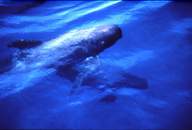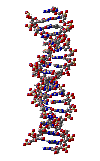|
A brave new “old world“of RNA (11/2004)
A new function for RNA, which further elucidates how genes are expressed and regulated, is described on the 25th of November issue of the journal Nature.
In our world DNA is the hereditary basis for most living organisms. Genes are segments of DNA and it is the information contained in all the genes of an organism that, when translated into proteins, makes up the blueprint for the body structure and function. Gene expression (into proteins) is done in two steps: transcription, by which genetic information in DNA is converted into RNA and translation, which is the synthesis of proteins based on the instructions contained in the new made RNA (basically will be DNA → RNA → protein). Both processes are crucial for correct gene expression/protein production and corruption in either of them can lead to disease.
Now Alexandre Teixeira and colleagues at Sir William Dunn School of Pathology, University of Oxford, UK and at The Wellcome Trust Sanger Institute, Cambridge, UK discovered that the end of transcription could be regulated by the RNA molecule itself, acting as an enzyme. Enzymes accelerate (catalyse) chemical reactions without being altered in the process and are extremely important for life reactions, many of which could not happen without enzymes. And although RNA can be created in the laboratory to behave as an enzyme (in which case it is called a ribozyme) very few examples exist in nature and almost none is found in complex organisms. This makes the results of the team of scientists, describing how a natural occurring ribozyme regulates termination of transcription, extremely exciting. Furthermore, by definition, transcription termination is directly associated with correct gene expression and any data that can lead to a better understanding of this process is especially important.
Also, a question that has always puzzled scientists was why about 32% of the human genome/DNA, although transcribed into RNA, never leads to protein production (DNA → RNA → no protein). Why would evolution have allowed the conservation of such big quantities of apparently non-functional DNA/RNA? What recent research has unveiled is that RNA seems to have a much more important role in gene expression than previously thought and is not only a mere helper between DNA and proteins. In fact, some of that RNA which is not translated into proteins, has been shown to be involved in gene regulation or, like the one described in this paper, is capable of catalyzing a chemical reactions like an enzyme.
This versatility leads back to the idea of an ancient “RNA world” where life was based on multifunctional self-replicating RNA molecules. Teixeira and colleagues’ work give support to such hypothesis by showing that in humans there are ribozymes involved in key cellular reactions and maybe they were once capable of mediate all the processes necessary to sustain life.
Work by Teixeira et al., showing that termination of transcription is regulated by a ribozyme, has important implications. In fact, the results by the team of scientists not only help our understanding of how gene expression is regulated, and consequently how incorrect gene expression can be controlled, but also contribute to the ongoing debate on the origin of life.
 1 Nature (2004); Vol. 432 (7016), pp. 1 Nature (2004); Vol. 432 (7016), pp.
"Autocatalytic RNA cleavage in the human b-globin pre-mRNA promotes transcription termination”
Original paper’s authors
Link to the original paper
|
In collaboration with the Observatório da Ciência e do Ensino Superior (OCES)
Financed by the Fundação para a Ciência e Tecnologia (FCT) |





